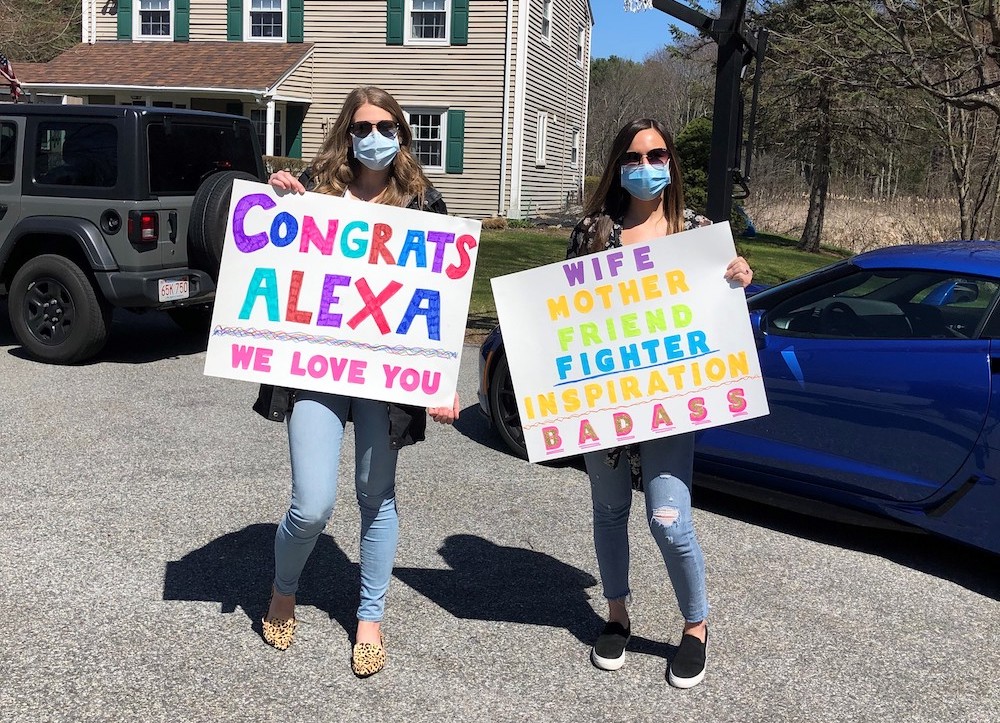On the morning of Sept. 12, 2019, Alexa Morell watched her son, Maddox, walk for the first time. Later that day, she learned she had colon cancer.
The second milestone confounded Morell as much as the first delighted her. She was just 29 years old, with a clean bill of health from her annual physical a month before. Colon cancer, she thought, was for older people. Two weeks of bloody stools had prompted her to visit a gastroenterologist, then get a colonoscopy, but friends who were nurses assured Morell the procedure would likely reveal hemorrhoids at worst.
Once the diagnosis was confirmed — stage IV colon cancer, which had progressed from her colon to her liver — Morell’s mind raced. She had seen Maddox’s first steps; what would she not be around to see?
Morell had yet to learn from her Dana-Farber oncologist Matthew Yurgelun, MD, that just as colon cancer can sometimes develop in patients well below middle age, it can also be contained and even eliminated at later stages.
“I’ll never forget what Dr. Yurgelun told me when we met,” says Morell. “Because I was young, and because the cancer had only progressed to one other place, he was going to throw everything he had at it. We were going for the cure.”

During the months to come, this edict became a source of confidence for Morell and her husband, Ryan. There would be more steps for the family to enjoy.
“Dr. Yurgelun held my hand the whole time, and the entire team at Dana-Farber was amazing,” says Morell. “I was in the right place, with the right people, to get through this.” In addition to Yurgelun, Morell works with experts in Dana-Farber/Brigham and Women’s Cancer Center’s Young-Onset Colorectal Cancer Center, which focuses on the unique challenges individuals under the age of 50 face when diagnosed with colorectal cancer.
Pandemic parade
Nobody, including Yurgelun, could have anticipated the additional challenges Morell would face during her treatment. Her protocol was 12 chemotherapy infusions, one every two weeks, with surgery in the middle and end to remove as much of the tumor as possible. Things went according to plan until March, when the COVID-19 pandemic hit Massachusetts.
Suddenly, due to Dana-Farber’s current no-visitor policy, her husband was not allowed to accompany Morell to her Dana-Farber appointments. She could not hug her mother after a tough infusion, or talk with friends beyond the phone and computer screen. Trips to Disney World and the Caribbean, long on the family’s calendar for September and December, were now unlikely.
Despite such obstacles, Morell says Dana-Farber always made her feel safe and loved. So did her husband, who arranged a surprise parade for when the couple and Maddox drove home after Alexa’s final chemotherapy infusion. Loved ones and neighbors, practicing safe social distancing, lined the road holding up signs reading “You did it!” and “In This Family, No One Fights Alone!”
“I was bawling my eyes out,” Morell says, “but it was great having the people who had been there for me all along be able to celebrate with us.”

Eye toward advocacy
More celebrating came in mid-May, when Morell was declared cancer-free after her second surgery. She still couldn’t hug her mother due to COVID-19, and would have to wait six weeks before picking up Maddox as her stitches healed. But a week after the operation she started working fulltime from home and enjoying watching her toddler “explode in language” as his second birthday neared. Each new word or number he comes up with is a gift, she says, and Morell is thrilled to be able to experience so many of them firsthand. As a working mom, she knows this won’t always be the case.
Her cancer experience and the support she received from her caregivers and fellow patients on social media has led Morell commit to advocacy work.
“The blood tests you have at your annual physical can be screened for leukemia and other blood cancers, but not for colon cancer,” she explains. “Dr. Yurgelun thinks I had this for years without knowing it, and that I had stage IV disease my entire pregnancy without any signs until my bloody stool.
If I waited until the recommended age to get a colonoscopy (45 years old), it would have been too late.
“I was lucky, but I want to help other people so that maybe less of them have to go through what I did.”

Dana Farber also saves me from colorectal cancer . God Bless all the hard working physicians and nurses